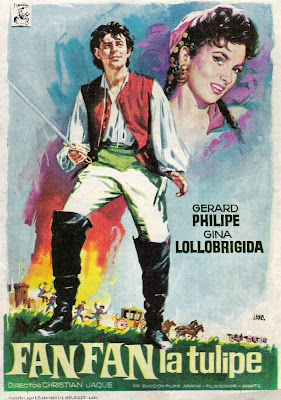Against All Flags (1952) is a story of swashbuckling espionage set in Madagascar in the year 1700. Brian Hawke, played by Errol Flynn, is an officer in the Royal Navy whose mission is to infiltrate a fortified settlement of pirates who threaten trade in the Indian Ocean. Presenting himself as a deserter who now desires to join the pirates and sail "against all flags," Hawke must allay suspicions that he is a spy as he attempts to learn the pirates' defenses.
There are, however, complications, and foremost among them is the daughter of the Grand Mogul whom he saves from a burning ship and whose true identity he must conceal lest the pirates ransom her or worse, which would put at risk the life of every Englishman in India. Mistress Stevens is the other complication. Otherwise known as "Spitfire" (and played accordingly by Maureen O'Hara), Stevens is a strong-willed woman with her own ship, which entitles her to a place amongst the captains who rule the pirate port. Both women take an interest in Hawke and, well, that accounts for half the story.
There are many attempts throughout the film to convey the bravado, wit, and charm of Flynn's classic swashbuckling forays, but it is merely superficial when there is no greater drama to support it. The importance of stopping the pirates is undermined by both the lack of commitment by the Royal Navy (one ship to destroy an entire fortified port?) and the buffoonery of its officers (of a kind more in keeping with Gilbert and Sullivan than with reality). The importance of defending the honor of the Grand Mogul's daughter is rather compromised by the lighthearted portrayal of women being sold at auction as "lawful wedded wives" to pirates, one of whom asks upon purchasing his spouse, "Now that I got her, what does I do with her?" The importance of any serious aspect of the story whatsoever is utterly deflated by the stilted dialogue, the unconvincing sets, the freshly laundered costumes of nearly every ne'er-do-well inhabitant of the pirate port, and the clownish acting of every actor in the film with the exception, to a degree, of Flynn, O'Hara, and perhaps the two actors playing Hawke's subordinates, Jones and Harris (Phil Tully and John Alderson).
Flynn seems obviously tired in this film, but O'Hara manages to infuse her role with as much subtlety and energy in the right places as the shallow writing will allow. Anthony Quinn, who plays Captain Brasiliano, the chief villain, plays his role as it was probably written: as a loud, cloddish bully. The worst performances belong to Bill Radovich as Hassan, the eunuch on the Grand Mogul's ship (giving what appears to be an impersonation of Curly Joe Dorita), and Paul Newlan as Crop-ear, the pirate who doesn't know what do with the "wife" he bought. They were undoubtedly intended as comic relief, but the only relief they provided was their absence.
At another time, with another writer, another director, another studio, and a change of almost the entire cast, Against All Flags might have been a good romantic adventure in the swashbuckling tradition. Instead, it is a lighthearted musical with only one song (a sea chantey sung by Flynn) performed as if by a local community theatre. Against All Flags is not entirely without its merits, but they are easier to observe if one's expectations are low.
Writing: PoorDirecting: Mediocre
Acting: Poor
Cinematography: Fair
Stunts: Fair
Swordplay: Fair
Panache: Fair
Overall Rating: Mediocre
Swashbuckling Rank: Fair
[Originally posted in Cuparius.com on 29 March 2011.]
Addendum
Written by: Æneas MacKenzie and Joseph Hoffman
Directed by: George Sherman
Performed by: Errol Flynn, Maureen O'Hara, Anthony Quinn, et al.



